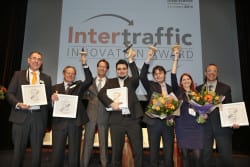Intertraffic Amsterdam opened this week with the eagerly anticipated announcement of the winners of the event’s prestigious Innovation Awards.
Awards were presented in five separate categories at the the Amsterdam event: Traffic Management; Parking; Safety; Smart Mobility and Infrastructure.
During the opening ceremony it was revealed that the top accolade of Overall Winner – out of a total of 91 entries – went to the Czech Republic’s CROSS Zlín, who dazzled the jury with their InVipo product, a smart platform for use in smart cities and ITS projects, capable of visualisation, data aggregation, monitoring and integrating. InVipo also came top in its category – Smart Mobility – in the face of stiff competition from the two other shortlisted companies Siemens, whose Sitraffic SiBike system helps to prioritise signals for cyclists, and Parkmobile, whose innovative parking payment and reservation solution can be fully integrated into a car dashboard.
InVipo particularly impressed the judges by bringing to life the concept of a smart city, integrating a wide variety of data, including traffic counts, parking availability, traffic signal timings and weather in one easy-to-access web-based visualisation platform. It also showed how additional data streams can easily be added, proving that the days of simple ‘traffic management’ are now numbered. In the future we will talk about ‘smart city management.’

The winner in the Infrastructure category was Smart Ultimate Lighting, created by HR Groep from The Netherlands. The product is an innovative light-up road sign constructed using the same illuminating foil that is used in mobile phone screens. What’s more, the sign surface itself doubles as a solar panel, thanks to a transparent layer of photovoltaic cells, meaning it is completely self-powering. The jury was extremely impressed both by the potential ease-of-installation of this system and its implications for improving safety, while offering also a sustainable solution.
Runners-up in the infrastructure category were Silca Traffic Systems’ Quick-Cube, a self-supporting LED highway light which can be used for roadworks, events and security and Aisico Srl’s ADD_C software, impressive for its ability to aid in drone-based infrastructure surveys.
The Traffic Management category was won by Houston Radar for its SpeedLane product. Thanks to ultra-low power consumption, the SpeedLane multi-lane side-fire traffic radar is able to pack an impressive amount of hardware into a single solar-powered unit. It can monitor, count and classify vehicles in up to eight user-defined lanes. It also includes a camera for visual back-up and ease of installation. Once installed it can start transmitting data to a cloud-based server almost immediately. The jury particularly liked the fact that this product is making advanced traffic management systems accessible to authorities on tight budgets, around the world.
Runner-ups in the Traffic Management category were the Ortana Meteos, a road-weather monitoring system and APM PRO’s OnDynamic, a complete traffic management system that uses Bluetooth sensors.
The UK’s WheelRight won the Safety category with its WheelRight Tyre Pressure Technology system. The roadside installation is capable of measuring tyre pressures on any vehicle without the need for any mechanical intervention. The vehicle only needs to drive over embedded sensors for a reading to be made.
Also shortlisted, the Safer Traffic Platform, created by Safer Place, Israel, uses video technology to spot high-risk traffic and parking violations. The final product in the shortlist was EBO Van Weel’s vehicle-mounted VMS.
The UK arm of Netherlands-based Parkmobile Group won the Parking category for the development of its existing RingGO app. It has been enabling users to pay for their parking remotely for several years – but now the RingGO Parking Prediction app is being rolled out with the ability to check availability of parking spaces in advance and help with navigation to those spaces. Some availability is made certain through the use of sensors embedded in roads. However, what really impressed the jury was the development of a predictive algorithm, which can tell users what likely availability is upon arrival, even for spaces that do not have sensors.
Also shortlisted in the parking category were Park Assist LLC’s upgraded M4 Smart-Sensor System, which now includes streaming video surveillance and ALPR data and HR Groep’s MB multilayer parking, a robust and cost-efficient multi-layer bike parking system.





